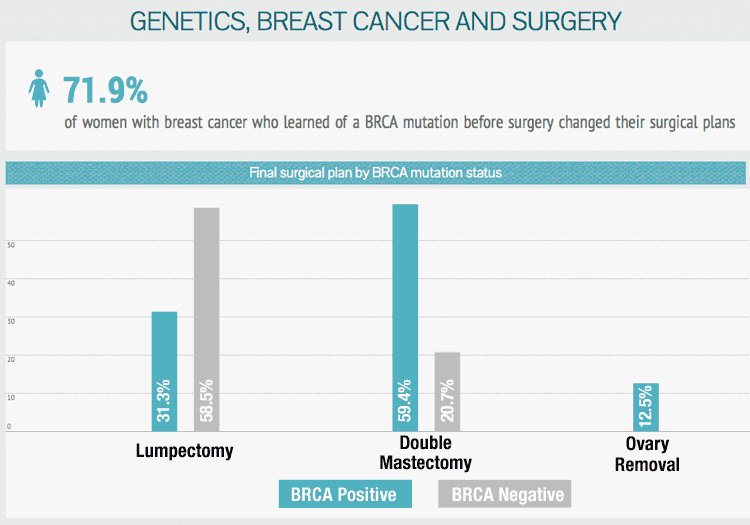PROVIDENCE, R.I. [Brown University] —Women diagnosed with breast cancer often face a crucial decision about the extent of their surgical treatment. Many meet national guidelines recommending testing for mutations in the BRCA 1 and 2 genes, which carry a substantial risk of future cancer. A new study reports that among women with breast cancer who undergo recommended testing before surgery, more than 7 in 10 who test positive will change their surgical plan, typically opting for a more extensive procedure such as a double mastectomy and sometimes ovary removal.
“As soon as somebody hears they have a 65 percent chance of a new breast cancer in the future or an up to 60 percent chance of ovarian cancer, they are likely to do whatever they can to prevent that,” said lead author Dr. Elizabeth Lokich, an obstetrics and gynecology fellow in the Warren Alpert Medical School of Brown University and at Women & Infants Hospital.
The study appears online in the journal Gynecological Oncology with the recommendation that women who meet National Comprehensive Cancer Network guidelines for genetic testing get the test before deciding on their surgery.
“Particularly because of what we found – that it changes their surgical planning – it really makes the most sense to have this evaluation done pre-operatively,” Lokich said.
The study was based on a retrospective review of the records of 302 Women & Infants breast cancer patients who had undergone preoperative genetic testing between 2006 and 2012 because they met the NCCN guidelines. Within that group, 32 learned that they carried a mutation in their BRCA1 or BRCA2 genes. With that information, 71.9 percent, or 23, of the women who tested positive changed their surgical plan compared to only 28.9 percent of women who tested negative.

A new study found that women with breast cancer often change their surgical treatment plan when they learn preoperatively that they have a BRCA gene mutation. The bar chart above shows the women's ultimate plans by their BRCA status. Click for larger image.
Among the mutation carriers, 31.3 percent chose lumpectomies, while 59.4 percent chose double mastectomies and one in eight chose ovary removal. Among women who tested negative, 58.5 percent chose lumpectomies, only 20.7 percent chose double mastectomy and none elected to have their ovaries removed.
Stress and timing
Many women who meet the guidelines do not have a preoperative genetic test, even though it can provide important information. The effect of a positive BRCA mutation test on surgical decision-making had not been studied before and doctors have debated what the best timing should be. Some have argued that testing would add too much stress at a time when women are already coping with learning of their serious diagnosis. Indeed, Lokich acknowledged, some women choose not to be tested.
But Lokich said other studies suggest that genetic testing doesn’t add much stress overall.
Instead, the likely reason most women in the study who tested positive for BRCA mutation often changed their surgery plan from lumpectomy to double mastectomy was to prevent a second bout of breast cancer or ovarian cancer.
In the study Lokich and her colleagues found that genetic testing significantly delayed getting to surgery, but not by enough to postpone it past the 90 days post-diagnosis that studies have shown to be clinically significant.
The authors therefore concluded, “We recommend that women meeting NCCN referral guidelines have their genetic evaluation done prior to surgical intervention.”
In addition to Lokich, the paper’s other authors are Drs. Ashley Stuckey, Christina Raker, and Jennifer Gass and genetic counselors Jennifer Wilbur and Jessica Laprise.
